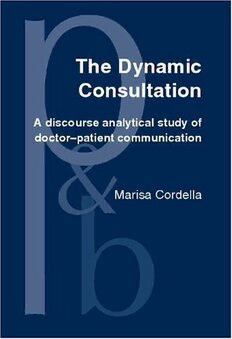Download The Dynamic Consultation: A Discourse Analytical Study of Doctor-Patient Communication PDF Free - Full Version
Download The Dynamic Consultation: A Discourse Analytical Study of Doctor-Patient Communication by Marisa Cordella in PDF format completely FREE. No registration required, no payment needed. Get instant access to this valuable resource on PDFdrive.to!
About The Dynamic Consultation: A Discourse Analytical Study of Doctor-Patient Communication
This book introduces a unique model of medical discourse that identifies the forms of talk – voices – that doctors and patients use during the consultation, and studies the dynamic interaction as it unfolds particularly in follow-up visits. Natural recordings, semi-structured interviews, questionnaires and ethnographic observations provide the data for the research, which was carried out in an Outpatient Clinic in Santiago, Chile. Using an interactional sociolinguistic approach, analysis of the data identifies doctor–patient communication as a micro-performance of broader socio-cultural realities, in which social status, power, knowledge and personal beliefs and values all find expression in the consultative setting. Importantly, while both doctor and patient voices are shown to contribute to an essentially asymmetrical exchange, the study also identifies the holistic and empathic Fellow Human voice, which places doctors and patients on a more equal footing. In connection with this voice, the Spanish concept of simpatía is also discussed.While the model in this study was developed within a specific socio-cultural framework, it is hoped that it will be adapted and modified more widely and contribute to a better understanding between doctors and their patients.
Detailed Information
| Author: | Marisa Cordella |
|---|---|
| Publication Year: | 2004 |
| ISBN: | 9027253714 |
| Pages: | 271 |
| Language: | English |
| File Size: | 1.874 |
| Format: | |
| Price: | FREE |
Safe & Secure Download - No registration required
Why Choose PDFdrive for Your Free The Dynamic Consultation: A Discourse Analytical Study of Doctor-Patient Communication Download?
- 100% Free: No hidden fees or subscriptions required for one book every day.
- No Registration: Immediate access is available without creating accounts for one book every day.
- Safe and Secure: Clean downloads without malware or viruses
- Multiple Formats: PDF, MOBI, Mpub,... optimized for all devices
- Educational Resource: Supporting knowledge sharing and learning
Frequently Asked Questions
Is it really free to download The Dynamic Consultation: A Discourse Analytical Study of Doctor-Patient Communication PDF?
Yes, on https://PDFdrive.to you can download The Dynamic Consultation: A Discourse Analytical Study of Doctor-Patient Communication by Marisa Cordella completely free. We don't require any payment, subscription, or registration to access this PDF file. For 3 books every day.
How can I read The Dynamic Consultation: A Discourse Analytical Study of Doctor-Patient Communication on my mobile device?
After downloading The Dynamic Consultation: A Discourse Analytical Study of Doctor-Patient Communication PDF, you can open it with any PDF reader app on your phone or tablet. We recommend using Adobe Acrobat Reader, Apple Books, or Google Play Books for the best reading experience.
Is this the full version of The Dynamic Consultation: A Discourse Analytical Study of Doctor-Patient Communication?
Yes, this is the complete PDF version of The Dynamic Consultation: A Discourse Analytical Study of Doctor-Patient Communication by Marisa Cordella. You will be able to read the entire content as in the printed version without missing any pages.
Is it legal to download The Dynamic Consultation: A Discourse Analytical Study of Doctor-Patient Communication PDF for free?
https://PDFdrive.to provides links to free educational resources available online. We do not store any files on our servers. Please be aware of copyright laws in your country before downloading.
The materials shared are intended for research, educational, and personal use in accordance with fair use principles.

